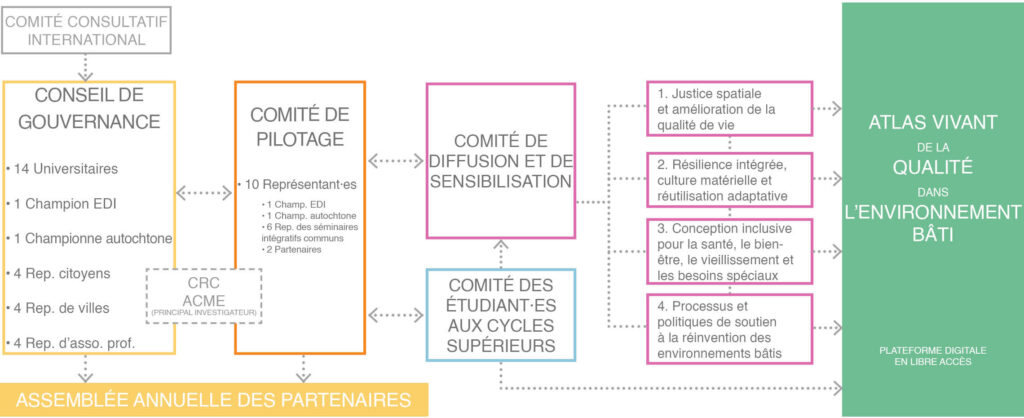Common principles

The overall Partnership is based on four principles: collaboration, responsibility, participation, and EDI (Equity, Diversity, and Inclusion) as well as respect for Indigenous knowledge:
(1) Collaboration is essential to this partnership along with discussion and dialogue. The work is based on the sharing of tasks among researchers, partners, and students that involves mutual support between research sites, situated projects, and thematic clusters. The involvement of Citizens, Cities, Awards Organizations, Universities, and Students in all governance are a direct extension of this principle. This structure is designed to foster
(2) Responsibility. Each research site is led by a site leader, who makes sure, on behalf of the entire team, ensures that the work advances and that researchers, partners and students maintain productive collaborative relationships that continually promote the objectives. As often as possible, the site leader is a *new scholar mentored by a senior or mid-career scholar.
(3) Participation relates to the constant dialogue between the 4 types of stakeholders in local research sites as well as nationally. To sustain high levels of commitment, the partnership will maintain a schedule of at least two annual meetings per situated project while involving representatives of the stakeholders and active participation at the 2 yearly National Conventions (1 online + 1 in person). These activities will provide researchers, partners and students with frequent opportunities to engage collectively.
(4) Equity, diversity, and inclusionpermeates the entire partnership throughout research sites and situated projects, and through the involvement of EDI champions as well as representatives of Indigenous People. The Partnership will strive to maintain gender parity and to remove systemic barriers throughout the entire governance structure and all its activities. Diversity of skills, backgrounds, and points of view are essential for the attainment of research objectives and dissemination. All individuals appointed to the various committees will need to follow unconscious bias training modules and two of the Common Integrative Seminars (CIS 1 & 2) followed by graduate students are dedicated to EDI and IR.
Key Governance Objectives
- Ensure that the objectives of the partnership are met (Strategy)
- Ensure funds are being spent as intended (Financial Stewardship)
- Ensure partnership sustainability (Risk Management)
- Ensure the performance of the partnership (Steering Committee oversight)
- Ensure partnership culture and values (EDI + Indigenous Research + ethical frameworks)
The governance revolves around 3 vectors:
- Equitable and controlled sharing of financial resources (stewardship)
- Sustained and balanced engagement of each of the 4 groups of stakeholders across all sites
- Involvement, training and internship opportunities for students at all stages of the partnership
Governance is organized around a four-tiered organizational structure that continuously interact, with coordination being provided by the administrative team (located at UdeM), that will provide access to management resources.